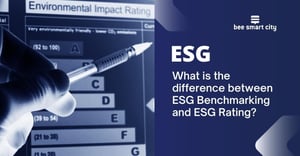ESG ratings, ESG benchmarking, ESG reporting, ESG indexing. These terms all sound the same, but they’re not. While there are many similarities between them, they’re also very different. Each of them describes a way that a company or a portfolio scores during an ESG assessment, and how that particular assessment was carried out.
There are many different ways of scoring a company’s ESG performance, from in-depth questionnaires, rigorous examinations, and in-person site visits, to short self-assessed quizzes. Some assessments measure scores based on very specific metrics, while others compare certain performance areas and measure them against their peers. Currently, there is no standard metric being used to score ESG, and that can make things quite confusing.
ESG isn’t necessarily a new topic, but it has come into the spotlight in recent years, and this new focus is forcing companies and portfolios to adapt, and for ESG scoring services and research houses to build consensus among them. At present, the ESG landscape is expected to continue being fragmented and misaligned, but that doesn’t have to be a bad thing.
According to ESG professionals, consensus will come in the future but as we’re still in the early days of ESG, it’s hard to predict when that will be. Some industry figures have even gone as far as to describe the state of ESG evaluations as a kind of Wild West at the moment. ESG has also been likened to the early days of blockchain. In summary: there’s no consensus about how to rate a company or property, with each service provider operating their own way and to their own standards.
Without consensus, what’s the point?
No matter how you look at it, ESG is growing in relevance. With a focus on the long-term sustainability of a business’s environmental, social, and governance strategies, it’s clear that ESG will play an important role in building a sustainable and equitable future. Whether you opt for a benchmarking study or a rating analysis, it doesn’t really matter. The important thing is to take positive steps in the right direction and begin putting together an actionable ESG strategy.
A lack of standard methodology is both a blessing and a curse. Without a common methodology, results and findings may offer little in the way of comparability, and this can be particularly problematic for companies that have enlisted the help from prestigious research houses, paying a large fee for a result that may not be comparable with other findings. However, those very same research houses can be hired to look at specific criteria that can be compared and contrasted with other industry measurements, such as ratings offered by BREEAM, LEED, DGNB, and specific EU regulations. This can be beneficial.
Another benefit to a lack of standardised methodology is the rise of benchmarking assessments. These assessments measure companies and portfolios against the performance of their peers rather than charting individual criteria. Interestingly, some benchmarking studies offer focused assessments on specific ESG areas, such as GRESB’s comprehensive Environment study. No matter what kind of study you choose, from ratings to benchmarking, and from focused criteria assessments to broader benchmarking studies, a comprehensive measurement is the most important step on your ESG journey. But what type of ESG service should you choose?
Below, we will look at the two most popular types of ESG services: ESG ratings and ESG benchmarking. Both have pros and cons, and both are incredibly valuable. Here’s what you need to know.
ESG Ratings
ESG ratings are comprehensive assessments of a company, portfolio, or building. They’re often conducted by well-established research houses and focus on delivering in-depth reports about every aspect of ESG. These studies draw on a wide range of sources, from public and private data, and feature detailed questionnaires of up to and above 300 questions. Assessments like these are conducted by experienced consultants who make site visits, conduct surveys and measure every aspect of a company or portfolio’s ESG criteria.
This kind of service is expensive and labour-intensive. However, the results offer an unparalleled insight into the state of a company’s ESG progress. The results are then used by consultants to develop further insights and design an ESG roadmap that tackles the company’s most pressing sustainability objectives.
Given the scale and cost of these projects, full ESG rating assessments are a sensible option for large corporates with the capital to invest in these studies, which are more likely to reap larger rewards in the long term. The results are also quite complex and may only be understood by ESG professionals or best used by companies with a dedicated sustainability team.
Pros
- In-depth evaluations are undertaken using vast private and public data pools
- Provide focused insights on specific criteria
- Specialist consultants that offer industry insights and trend predictions
Cons
- In-depth research like this is very expensive
- It’s an enormous undertaking that could demand a lot of time and resources
- The results are often confusing to those without expert knowledge of ESG
ESG Benchmarking
ESG benchmarking is very different to traditional ESG rating studies. In short, ESG benchmarking is a less invasive method of measuring a company or portfolio’s ESG. Generally speaking, these assessments are carried out with a short questionnaire that can be completed by a company owner or portfolio manager. These results are then measured and scored, and then compared with the results of peers to create a benchmark.
“Benchmarking” may not be as accurate as a traditional rating, but it’s no less valuable. It’s better to view it as a different product rather than as a competing form of study. For example, benchmarking offers a broader result, which can be particularly beneficial to smaller companies that perhaps lack the investment for an in-depth rating study, or for portfolio managers beginning their ESG journey who are looking for an overview of the state of their assets.
ESG benchmarking is a more affordable alternative to an in-depth rating assessment, with a broader result. It is a great choice for those looking for an ESG starting point. However, it will not provide the same results as an in-depth study.
Pros
- Comparatively inexpensive when compared to ESG rating assessments
- Less resource-intensive assessments
- The results can be measured against those of your peers for easy benchmarking
Cons
- The result isn’t as detailed as a comprehensive ESG rating study
- The study often won’t include a strategic ESG roadmap, though it often offers recommendations to improve ESG performance
- Like all ESG services, there is no uniform methodology
In Conclusion
The difference between ESG ratings and ESG benchmarking tools is significant, but both provide excellent value. For large portfolios looking for da etailed analysis of their ESG performance, seeking the help of an established advisory company such as Savills will deliver the best results. However, for smaller companies in search of an ESG outline and an initial assessment, ESG benchmarking services, such as those provided by ECORE will offer the best value for money, and ensure a great head start on an ESG journey.
Both methods will provide an unparalleled insight into the state of your ESG compliance. However, it’s easy to get confused with all the jargon, mainly because there is currently no consistent taxonomy or uniform criteria. Starting with a benchmarking study is a sensible way to ease into the world of ESG, especially as ESG ratings are still an emerging product and the accuracy of their results isn’t yet known. If you’re new to ESG, benchmarking is the ideal place to start. If you are already deploying a comprehensive ESG strategy, an in-depth rating may be a better option.
Both are important tools that the real estate business can harness to drive the evolution of the industry to a more sustainable future.
Get our Executive Summary on ESG in Real Estate!
In this Executive Summary on ESG in Real Estate, we lay out the essentials that Real Estate decision-makers should know to get from ESG compliance to leveraging ESG as a value driver for real estate portfolios.


